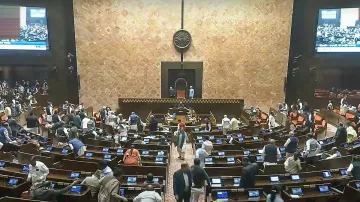Taking a significant step towards implementing the 'One Nation, One Election' recommendation, 12 Rajya Sabha members have been appointed to the Joint Parliamentary Committee (JPC). This committee has been entrusted with the task of studying and examining the feasibility and implications of holding simultaneous elections to the Lok Sabha, Rajya Sabha, and local bodies across India.
Union Minister Arjun Ram Meghwal suggested that the relevant bill be referred to the JPC. The expanded committee now has 39 members—27 from the Lok Sabha and 12 from the Rajya Sabha. The committee included prominent Rajya Sabha MPs Ghanshyam Tiwari, Bhubaneshwar Kalita, K Laxman, Kavita Patidar, Sanjay Kumar Jha, Randeep Singh Surjewala, Mukul Balkrishna Wasnik, Saket Gokhale, P.S. Wilson, Sanjay Singh, Manas Ranjan Mangraj, V.S. Written by Vijaysai Reddy.
The Lok Sabha members of the committee were named earlier this week, with the latest members including BJP MPs Baijayant Panda and Sanjay Jaiswal, Samajwadi Party's Chhotalal, Shiv Sena (UBT)'s Anil Desai, Lok Janashakti Party's Shambhavi and CPI(M) 's K. Radhakrishnan.
Bills at the center of debate
The JPC will scrutinise two key bills:
- The Constitution (One Hundred and Twenty-Ninth Amendment) Bill, 2024
- The Union Territories Laws (Amendment) Bill, 2024
These bills proposed an amendment to the Constitution to allow for simultaneous elections, an idea that has caused heated debate in Parliament. As the bills were introduced, there was strong opposition, resulting in a split vote with 269 members supporting the introduction of the rules while 196 opposed.
Opposition’s concerns
Opposition parties have expressed apprehensions over the proposal, arguing that simultaneous elections might centralize power and undermine the autonomy of regional parties. They have also raised concerns about potential disruptions to the federal structure of governance, claiming that the initiative could disproportionately benefit the ruling party by consolidating its influence across the states.
The JPC, representing diverse political ideologies and expertise, will now deliberate on these concerns and submit its recommendations. The government’s push for the proposal underscores its commitment to bringing electoral reforms that, according to proponents, could streamline governance and reduce election-related expenses
Also read | Om Prakash Chautala, INLD leader and former Haryana CM, dies at 89
Latest India News
